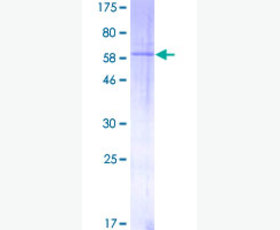Recombinant Human Interleukin-18/IL-18/IL-1F4
| Product name: | Recombinant Human Interleukin-18/IL-18/IL-1F4 |
| Source: | E.coli |
| Purity: | Greater than 95% as determined by reducing SDS-PAGE. |
| Buffer Formulation: | Lyophilized from a 0.2 μm filtered solution of PBS,pH7.4. |
| Applications: | Applications:SDS-PAGE; WB; ELISA; IP. |
| Storage: | Avoid repeated freeze/thaw cycles. Store at 2-8 oC for one month. Aliquot and store at -80 oC for 12 months. |
| UOM: | 100ug/50ug/200ug/1mg/1g |
| Source | E. coli |
| Description | Recombinant Human Interleukin-18 is produced by our E.coli expression system and the target gene encoding Tyr37-Asp193 is expressed. |
| Names | Interleukin-18, Iboctadekin, Interferon gamma-inducing factor, IFN-gamma-inducing factor, Interleukin-1 gamma, IL-1 gamma,GIF, IL-18, IL-1g, IL1F4, MGC12320 |
| Accession # | Q14116 |
| Formulation | Lyophilized from a 0.2 μm filtered solution of PBS,pH7.4. |
| Shipping |
The product is shipped at ambient temperature. |
| Reconstitution |
Always centrifuge tubes before opening. Do not mix by vortex or pipetting. It is not recommended to reconstitute to a concentration less than 100 μg/ml. Dissolve the lyophilized protein in ddH2O. Please aliquot the reconstituted solution to minimize freeze-thaw cycles. |
| Storage |
Lyophilized protein should be stored at < -20°C, though stable at room temperature for 3 weeks. Reconstituted protein solution can be stored at 4-7°C for 2-7 days. Aliquots of reconstituted samples are stable at < -20°C for 3 months. |
| Purity |
Greater than 95% as determined by reducing SDS-PAGE. |
| Endotoxin | Less than 0.1 ng/µg (1 IEU/µg) as determined by LAL test. |
| Amino Acid Sequence |
YFGKLESKLSVIRNLNDQVLFIDQGNRPLFEDMTDSDCRDNAPRTIFIISMYKDSQPRGMAVTIS VKCEKISTLSCENKIISFKEMNPPDNIKDTKSDIIFFQRSVPGHDNKMQFESSSYEGYFLACEKE RDLFKLILKKEDELGDRSIMFTVQNED
|
| Background | Interleukin-18 is a secreted protein and it belongs to the IL-1 family. IL-18 is a proinflammatory cytokine and produced by macrophages and other cells. This cytokine can induce the IFN-gamma production of T cells. The combination of this cytokine and IL12 has been shown to inhibit IL-4 dependent IgE and IgG1 production, and enhance IgG2a production of B cells. IL-18 binding protein (IL18BP) can specifically interact with this cytokine, and thus negatively regulate its biological activity. After stimulation with IL-18, natural killer (NK) cells and certain T cells release another important cytokine called interferon-γ (IFN-γ) or type II interferon that plays an important role in activating the macrophages or other cells. |














